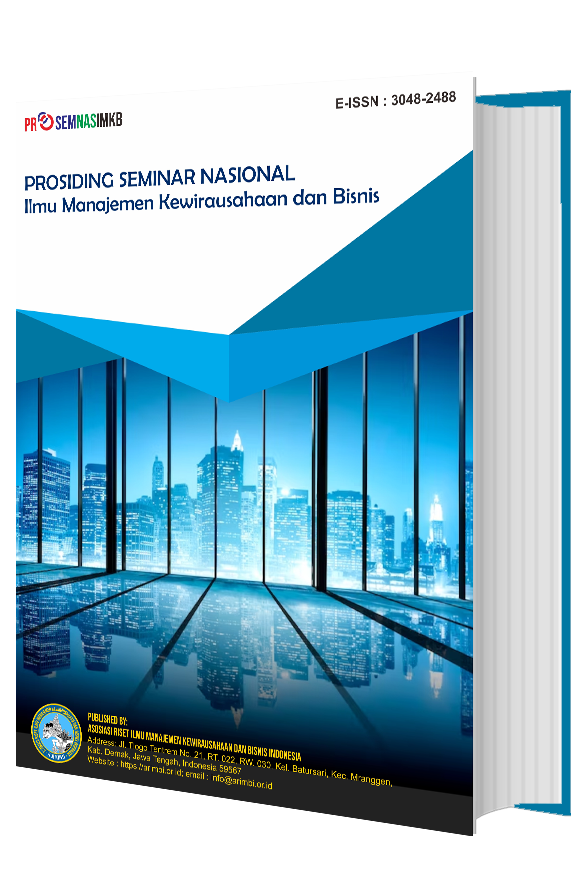Intensi Berwirausaha Mahasiswa : Peran Kreativitas dan Theory of Planned Behavior
DOI:
https://doi.org/10.61132/prosemnasimkb.v2i1.156Keywords:
Creativity, Entrepreneurial-Intention, Theory-of-Planned-BehaviorAbstract
The purpose of this research are to determine the influence of creativity, entrepreneurial attitude, perceived behavioral control, and subjective norms on the entrepreneurial intention of students at Sebelas Maret University, Surakarta This research is quantitative research with descriptive analysis. The sample in this study consisted of 381 active students at Sebelas Maret University, Surakarta who were currently taking or had previously taken entrepreneurship courses. Data collection was conducted using a questionnaire distributed via Google Forms. Data analysis used Structural Equation Modeling (SEM). The results of this study indicate that creativity, entrepreneurial attitude, perceived behavioral control, and subjective norms have a positive and significant effect on entrepreneurial intentions of active students of Sebelas Maret University, Surakarta. The conclusion of this study proves that the Theory of Planned Behavior has a relationship with the level of entrepreneurial intentions of students. The transformation of the Indonesian economy can be attempted by increasing the number of entrepreneurs through improving the quality of entrepreneurship education in universities.
Downloads
References
Ajzen, I. (1991). The theory of planned behavior. Organizational Behavior and Human Decision Processes, 50(2), 179–211.
Ajzen, I. (2002). Perceived behavior control, self-efficacy, locus of control, and the theory of planned behavior. Journal of Applied Social Psychology, 32(4), 665–683.
Anjum, T., Farrukh, M., Heidler, P., & Tautiva, J. A. D. (2020). Entrepreneurial intention: Creativity, entrepreneurship, and university support. Journal of Open Innovation: Technology, Market, and Complexity, 7(11), 1–13. https://doi.org/10.3390/joitmc7010011
Botha, E. I., & Wiese, M. (2024). Modelling zero waste behavioural intent: The moderating role of perceived behavioural control and socio-demographic factors. Cleaner and Responsible Consumption, 12, 100177. https://doi.org/10.1016/j.clrc.2024.100177
Chang, Y., & Chen, M. (2020). Ming-Huei Chen. European Management Journal. https://doi.org/10.1016/j.emj.2020.03.004
Hadiyati, E. (2011). Kreativitas dan inovasi berpengaruh terhadap kewirausahaan usaha kecil. Jurnal Manajemen dan Kewirausahaan, 13(1), 8–16. https://doi.org/10.9744/jmk.13.1.8-16
Hartono, J., & Puspitowati, I. (2019). Pengaruh attitude, subjective norms dan self efficacy terhadap intensi berwirausaha pada mahasiswa Fakultas Ekonomi Universitas Tarumanagara. Jurnal Manajerial dan Kewirausahaan, 1(2), 234–241. https://doi.org/10.24912/jmk.v1i2.5083
Iriani, S. S. (2023). The influence of personality, entrepreneurship curriculum, entrepreneurship knowledge, and attitude on entrepreneurship intention with social support as mediation. Journal of Information & Knowledge Management, 22(5), 1150084 (1–23). https://doi.org/10.1142/S0219649222500848
Liñán, F., & Fayolle, A. (2015). A systematic literature review on entrepreneurial intentions: Citation, thematic analyses, and research agenda. International Entrepreneurship and Management Journal, 11(4), 907–933. https://doi.org/10.1007/s11365-015-0356-5
Liñeiro, A. B., Ochoa, J. A. R., & de la Barrera, J. M. (2024). Exploring entrepreneurial intentions and motivations: A comparative analysis of opportunity-driven and necessity-driven entrepreneurs. Journal of Innovation and Entrepreneurship, 13(11), 1–28. https://doi.org/10.1186/s13731-024-00366-8
Miranda, F. J., Chamorro-Mera, A., & Rubio, S. (2017). Academic entrepreneurship in Spanish universities: An analysis of the determinants of entrepreneurial intention. European Research on Management and Business Economics. https://doi.org/10.1016/j.iedeen.2017.01.001
Moerdijat, L. (2023). Butuh konsistensi cetak wirausaha muda untuk wujudkan Indonesia sebagai negara maju. MPR.go.id. https://www.mpr.go.id/berita/, diakses tanggal 10 Mei 2025.
Muhammad, A. D., Aliyu, S., & Ahmed, S. (2015). Entrepreneurial intention among university students. American Journal of Business Education, 8(4), 239–248.
Murad, M., Li, C., Ashraf, S. F., & Arora, S. (2021). The influence of entrepreneurial passion in the relationship between creativity and entrepreneurial intention. International Journal of Global Business and Competitiveness, 16(1), 51–60. https://doi.org/10.1007/s42943-021-00019-7
Nengseh, R. R., & Kurniawan, R. Y. (2021). Efikasi diri sebagai mediasi pengaruh pendidikan kewirausahaan dan motivasi berwirausaha terhadap minat berwirausaha mahasiswa. Edunomic: Jurnal Pendidikan Ekonomi, 9(2), 156. https://doi.org/10.33603/ejpe.v9i2.5157
Nguyen, T. T., Phan, H. T. T., & Pham, V. T. (2021). Impact of creativity on student entrepreneurial intention. International Journal of Innovation, 9(3), 646–663. https://doi.org/10.5585/iji.v9i3.19659
Obschonka, M., Goethner, M., Silbereisen, R. K., & Cantner, U. (2012). Social identity and the transition to entrepreneurship: The role of group identification with workplace peers. Journal of Vocational Behavior, 80(1), 137–147. https://doi.org/10.1016/j.jvb.2011.05.007
Shi, Y., Yuan, T., Bell, R., & Wang, J. (2020). Investigating the relationship between creativity and entrepreneurial intention: The moderating role of creativity in the theory of planned behavior. Frontiers in Psychology, 11, 1209. https://doi.org/10.3389/fpsyg.2020.01209
Siregar, P. P., Julmasita, R., Ananda, S., & Nurbaiti, N. (2023). Pentingnya pendidikan kewirausahaan di perguruan tinggi. Asatiza: Jurnal Pendidikan, 4(1), 43–50. https://doi.org/10.46963/asatiza.v4i1.805
Souitaris, V., Zerbinati, S., & Al-Laham, A. (2007). Do entrepreneurship programmes raise entrepreneurial intention of science and engineering students? The effect of learning, inspiration and resources. Journal of Business Venturing, 22(4), 566–591. https://doi.org/10.1016/j.jbusvent.2006.05.002
Via, M., & Siswoyo, S. T. (2023). Pengaruh sikap, norma subjektif, efikasi diri, presepsi kontrol perilaku terhadap niat berwirausaha mahasiswa Fakultas Ekonomi dan Bisnis Universitas Muhammadiyah Metro. Jurnal Manajemen Diversifikasi, 3(1), 65–78.
Zhang, X. E., & Zhang, K. (2018). The relationship between creativity and entrepreneurial intention: A moderated mediating effect model. Foreign Economics & Management, 40(3), 67–78. https://doi.org/10.16538/j.cnki.fem.2018.03.005
Downloads
Published
How to Cite
Issue
Section
License
Copyright (c) 2025 Prosiding Seminar Nasional Ilmu Manajemen Kewirausahaan dan Bisnis

This work is licensed under a Creative Commons Attribution-ShareAlike 4.0 International License.






